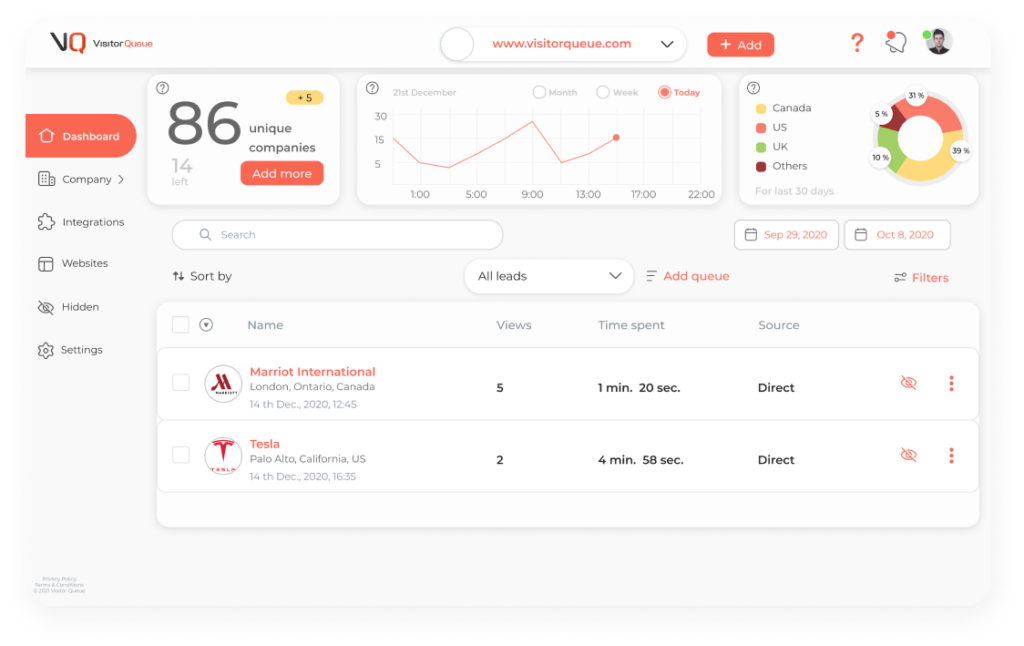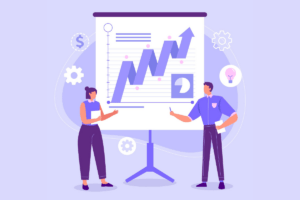Competition is at an all time high. That’s why B2B marketing professionals need more than just industry expertise, they need to make data-driven decisions. Using big data in B2B marketing strategies can help you better understand your audience and, therefore make better decisions. In this guide, we’re going to go through the best software to help you generate big data, and how you can apply big data in B2B marketing strategies. First, let’s go over what big data even is.
What is Big Data?
Big data refers to the massive volume of both structured and unstructured data generated by businesses every day. This data comes from various sources, including social media platforms, website analytics, data software tools, your CRM, and more. Since big data is so vast, analyzing, extracting, and interpreting it can sometimes be challenging. But, through automation and data cleanup tools, you are able to leverage big data in B2B marketing strategies and ensure you’re attracting the right people.
Five V’s of Big Data
When talking about big data, we often hear about “V’s”. These V’s refer to:
- Velocity: The speed at which the data can be created
- Volume: The amount of data that you are dealing with
- Variety: The types of data that are available
- Value: The way that the data is put to use
- Veracity: The quality of the raw data before it is reconstructed
The five V’s work together, and can help you figure out the quality of the data you are working with. As an example, if you have a large volume of data, but the veracity or quality of it is poor, then there’s a good chance that you won’t get the most optimal results.
Finding Big Data with Software
Software tools are a vital part of generating enough data to be considered big data. There are a number of tools and applications that can be used to identify this kind of information. It’s helpful to use more than one tool, so you can get a better understanding of your entire marketing strategy instead of just one specific area. Now, let’s go over some of the most important software that you should consider when you’re looking to use big data in B2B marketing strategies.
Analytics Tools
Analytics tools like Google Analytics, Hotjar, or Visitor Queue can be used to track website traffic, user behavior, and engagement metrics. These tools provide valuable data that can then be used to optimize your website for a better user experience. As a result, you might be able to increase your website’s conversion rate.
Customer Relationship Management (CRM) Software
CRMs like Salesforce or HubSpot help store and organize your customer’s information. By integrating your CRM with your marketing efforts, you can get a holistic view of your strategies, data, and successes. The higher quality information that you have in your CRM, the more personalized your marketing campaigns will be. As a result, you have a better chance of properly communicating with your customers and retaining them for the long term.
Social Media Management Software
Leverage social media tools like Hootsuite to monitor conversions about your brand and industry. By understanding social trends, you can make informed marketing decisions. And, you are also able to engage with your audience more effectively. Using a tool like Hootsuite can be helpful when you want to see all of your platforms in one place. Plus, you can add in your competitor’s channels to monitor what they are doing to compare and contrast.

Top B2B Marketing Strategies That Use Big Data
Now that you know how to collect big data, let’s go over how you can use the information in your marketing strategies.
Personalized Marketing Campaigns
One of the best and most effective uses of big data for B2B marketing is to create personalized marketing campaigns. Big data can help your marketing team get a better understanding of customer preferences, behavior, and pain points. By knowing this information, your marketing team can tailor content to their needs. As a result, you can improve your content’s relevance and guide leads down your sales funnel more easily.
Predictive Analytics
As the name implies, predictive analytics can help you anticipate customer’s needs and behaviors based on previous data and trends. By analyzing your historical data, patterns, and trends, companies can gain the insight they need to make informed decisions. This means that your marketing initiatives are strategically aligned with future expectations, to ensure you’re not over or under-spending.
Account Based Marketing
Account based marketing, or ABM, is defined as a marketing strategy that concentrates resources on a set of target accounts within a market. Big data can help identify high-value accounts and understand their pain points. This allows personalized marketing campaigns as we talked about earlier.
Customer Retention
Customer retention is crucial for B2B companies. Big data analysis can help you discover at-risk customers, allowing businesses to implement proactive retention strategies. Retention strategies like improving your email campaigns can make or break how long you retain customers. In addition, by analyzing customer interactions and feedback, you’re able to promptly address issues, improve customer loyalty, and minimize churn rates.
Discovering Big Data with Visitor Queue
If you’re looking to improve your data, Visitor Queue has your back. By adding a tracking script to your website, you are able to identify the companies that visit. This includes how each company is acquired, what pages they view, and how long they spend on each page. You also get access to company information like what industry they’re in, location, headcount, and more. Not to mention, you can also see key employees that work at the companies including contact information like email addresses, phone numbers, and a link to their personal LinkedIn profile. Additionally, you can send this information directly to your CRM platform using one of our many integrations available. Start your 14-day free trial today and stop losing leads.

Wrap Up
If you’re looking to generate higher quality results from your marketing campaigns, big data is a great place to start. By implementing software to generate data, and applying this data to your marketing efforts, you are more likely to attract the right audience and retain them as loyal customers. As always, if you have any questions about using Visitor Queue to generate big data, do not hesitate to reach out.
 Identify
Identify Personalize
Personalize Benchmark
Benchmark Agencies
Agencies Integrations
Integrations Case Studies
Case Studies Use Cases
Use Cases Blog
Blog Resources
Resources









